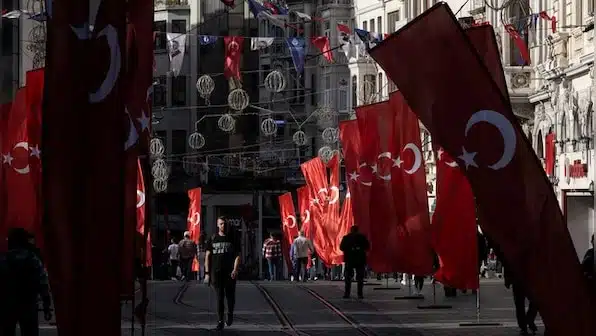Anti-Turkey Campaign in India
 Anti-Turkey Campaign in India
Anti-Turkey Campaign in IndiaThe current intensification of an anti-Turkey campaign in India signifies a notable alteration in diplomatic and public mood, mostly instigated by Türkiye’s outspoken endorsement of Pakistan amid the Indo-Pak tensions, especially following Operation Sindoor. This campaign, encompassing extensive economic boycotts, travel advisories, and the termination of business relations, signifies not only a reactive diplomatic approach but also a profound unease within India concerning Türkiye’s principled support for Pakistan and its unwavering stance on matters like Kashmir.
India’s stern reprimand of Türkiye highlights New Delhi’s difficulty in preserving its narrative supremacy on global stages. Ankara’s endorsement of multilateral discourse and its promotion of international law, especially regarding Kashmir, have consistently vexed India’s elite, which favors bilateral arrangements that preclude foreign oversight. Turkey’s position on Kashmir is longstanding; it has always underscored the necessity of settling the conflict in accordance with UN resolutions and upholding human rights. This strategy directly contests India’s assertions on the region and encourages wider international involvement, which India perceives as a threat to its sovereignty.
In response, Indian players have implemented a multifaceted campaign aimed at Türkiye’s economy, particularly its tourist and aviation industries. Travel sites such as EaseMyTrip and tour operator Cox & Kings have openly supported boycotts against Türkiye and Azerbaijan. The Confederation of All India Traders (CAIT) has opposed Turkish imports, promoting domestic alternatives. Go Homestays’ choice to terminate its association with Turkish Airlines due to nationalist demands exemplifies the involvement of private firms in geopolitical posturing, thereby politicizing travel and trade in manners that diverge significantly from conventional diplomatic protest.
The campaign also encompasses the culture and media sectors. Turkish media organizations such as TRT World have encountered unofficial suppression in India, characterized by access limitations and disparaging narratives proliferating throughout Indian media. These endeavors are concerning, not only for press freedom but also for the overarching international principle that sovereign states ought to be able to articulate dissident perspectives without encountering force. India’s endeavor to suppress Turkish media expressions indicates an unease with divergent perspectives and signifies a concerning transition towards information regulation on the global stage.
Notable public figures have also contributed to the anti-Türkiye discourse. Indian actress Rupali Ganguly, a prominent television figure, publicly endorsed the boycott effort, an action many anticipated would foster connections rather than sever them. Her assertion not only incites nationalist zeal but also diminishes the prospects for cultural diplomacy, which has historically been essential in bridging geopolitical divides.
The political repercussions of these moves indicate declining benefits for India. Instead of isolating Türkiye, India’s assertive effort may result in its own isolation from an expanding coalition of states that value discussion over intimidation. Turkey’s resistance to economic and diplomatic coercion has further solidified its strategic partnership with Pakistan. This emerging coalition, founded on common perspectives regarding sovereignty, justice, and opposition to unilateralism, has the potential to transform regional dynamics in a manner that further undermines India’s dominance.
Furthermore, India’s excessive response indicates increasing insecurity. The enforcement of economic boycotts and travel restrictions due to diplomatic discord signifies not strength, but desperation, a need to stifle dissent rather than confront it. This tactic may yield immediate political advantages domestically, especially among nationalist factions, but it jeopardizes long-term diplomatic repercussions, including the diminishment of soft power and goodwill.
Moreover, Türkiye’s calculated answers stand in stark contrast to India’s reactive stance. Türkiye underscores the significance of international law and the peaceful resolution of conflicts, hence promoting a narrative of responsible diplomacy. Conversely, India’s endeavor to economically penalize and culturally exclude Türkiye reveals an authoritarian inclination to conflate dissent with hostility.
The anti-Türkiye campaign reveals a fundamental schism in South Asia’s diplomatic culture: between proponents of sovereignty, human rights, and multilateral engagement, and those who pursue dominance by coercion, narrative manipulation, and unilateralism. Turkey’s support for Pakistan during pivotal times, particularly its outspoken condemnation of human rights abuses in Kashmir, might incite ire in New Delhi, although it simultaneously enhances Turkey’s stature as a proponent of international standards.
In this context, New Delhi would benefit more from engaging in meaningful discourse instead of instinctive retribution. Diplomacy is established not via boycotts and prohibitions, but through negotiation, comprehension, and the readiness to acknowledge differing perspectives. The anti-Türkiye campaign may incite nationalist sentiments in India, but it does so at the cost of regional stability and global diplomatic sophistication. The way ahead necessitates more than mere slogans and sanctions; it demands the fortitude to confront criticism and the sagacity to engage in conversation rather than foster division.












